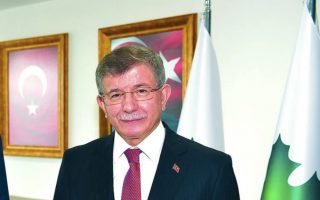Turkey’s transformation into regional power ‘irreversible’

Turkey’s economic troubles and the political changeover in Washington have caused a “rebalancing” of the country’s foreign policy away from assertive and combative discourse, Sinan Ulgen, a visiting scholar at Carnegie Europe in Brussels and chairman of the Istanbul-based Center for Economics and Foreign Policy (EDAM) think tank, tells Kathimerini in an interview.
Although confident that “Turkey’s gradual transformation into a regional power is indeed irreversible,” Ulgen believes that Islamism “will be on the decline” in the years to come.
Asked about disputes with Athens, he says Ankara would be willing to seek recourse to The Hague, admitting, however, that doing so would require “some convergence with Greece” on the nature of these disputes.
Is Turkey in a process of re-evaluation of its foreign policy now that Joe Biden is in the White House? Will it try to act as a US and NATO ally while continuing to pursue its goal of establishing itself as a regional power?
It would be safe to assume that Turkey’s ambition to position itself as a regional power is here to stay. There is however a rebalancing of its foreign policy away from the more assertive and combative rhetoric of the past year. This is partly driven by the economic situation at home, partly by the change of the administration in Washington, but also by now a more realistic assessment of Turkey’s potential impact in its region.
Who are the main players challenging Recep Tayyip Erdogan’s version of Turkey’s future? Do they have any chance in 2023 or does President Erdogan still command strong support and hold all the cards?
The leadership race is in fact quite open. The outcome of the 2023 elections is far from pre-ordained. There are a number of political leaders including Meral Aksener, the chairwoman of the center right IYI Party, Ekrem Imamoglu, the mayor of Istanbul, as well as Mansur Yavas, the mayor of Ankara, who is currently polling close to and sometimes better than Erdogan himself. According to the latest poll results published by Turkiye Raporu, support for the ruling AKP-MHP coalition is down to 45% with the opposition at 55%. The core vote of the ruling AKP is down to 26.5% (before the undecideds are distributed). So it would be fair to say that Erdogan faces an uphill battle ahead of the critical 2023 elections.
Is the recent letter from the admirals expressing concern over the “Islamization” of the army an adverse act against President Erdogan that will lead to serious repercussions?
There will not be any serious repercussions from the admirals’ letter. At the time of writing, all the admirals have been freed. Obviously, the difference with the past is that these were all retired admirals and their statement should have been considered within the scope of their freedom of expression.
Is the Turkish economy in a precarious position or it can weather any storm?
The Turkish economy is in difficulty. But the nature of the difficulty is different than for instance the past crisis of Greece. Turkey’s problem is not the lack of growth or a critical fiscal balance but rather a return to sustained high growth. The main reason is macroeconomic mismanagement which allowed inflation to turn rampant and foreign exchange reserves to be depleted. At present, Turkey has double-digit inflation at 16%. At the same time, net reserves of the Central Bank of the Republic of Turkey are negative with a deficit of almost 60 billion USD. So Turkey will need to adopt policies designed to lower inflation and also accumulate foreign reserves. That essentially means austerity measures, which will be difficult for the government, especially with a view to the 2023 elections. But engaging in electoral politics can destabilize the currency and consequently economic balances.
Is Turkey’s gradual transformation into a regional power irreversible and independent of President Erdogan’s future? Could we see, perhaps, a gradual merger of secularism and Islamism into one system of governance?
I tend to think that Turkey’s gradual transformation into a regional power is indeed irreversible. There are secular trends like the level of GDP, the country’s human resources and state capacity, foreign policy activism, humanitarian aid accomplishments and its growing military technology and capabilities. What may change is how Turkey is willing to leverage this power. For the last few years, Turkey has tested the proposition of leading an ambitious policy on its own. An alternative approach would rely on a redefinition of Turkey’s national interest more in line with Turkey’s true place within the community of Western nations. In that sense, Islamism is a trend that will be on the decline in Turkey’s future.
What is Turkey really asking of Greece? According to one view, Ankara is always expanding its claims in the whole border region from Cyprus to Thrace, placing new disputes on the table with the final aim of controlling half of Aegean, half of Cyprus and heavily influencing the region of Thrace. Is this a correct reading or would you say it’s rather unfair?
That’s a rather unfair one. Most Turkish politicians are aware of the futility of these types of overambitious objectives. But at the same time, many Turks believe that the international community is not being fair with regard to Turkey’s disputes with Greece and particularly in relation to Cyprus. There is by and large a bipartisan consensus in Turkey that the Turkish Cypriots fully deserve a different outcome that will allow them to enjoy the freedoms of any modern state. If this cannot happen on the basis of the mutual recognition of the political equality of the two communities on the island, then alternative outcomes should at least be explored. With regard to Greece, the Turkish viewpoint is that there remains a host of bilateral problems which need to be addressed. But obviously the only platform for the settlement of these problems is diplomatic negotiations. Despite some adverse commentary, Turkey is not opposed to taking some of these disputes to international courts. But even this step requires some convergence with Greece, at least regarding the nature of these disputes and the legal norms that will be submitted to the court.





